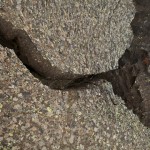
Reporter’s note: One of the benefits of interviewing others is the opportunity to meet those who are passionate about their careers and are committed to contributing to society. One of those is Mary Aebischer, new faculty member at Idyllwild Arts Academy. Since I was interviewing her in her classroom, and sitting in a student’s seat, at one point Aebischer moved to the blackboard to illustrate a point. She was the teacher. I was the student. The transition seemed natural.
Mary Aebischer, new Spanish II, III and IV teacher at Idyllwild Arts Academy is passionate not just about teaching but especially about how to teach.
“I did all my coursework in pedagogical training,” said Aebischer. “I had to have training in pedagogy.” Pedagogical training focuses on teaching students life-preparing knowledge such as social skills, social norms and social inclusion. “When you teach a language, you’re also teaching world view and culture. Sometimes that includes facing difficult issues. It’s about interconnectedness.” When asked how that could play out when teaching Spanish to teens, Aebischer elaborated. “Cultural identity and language are tied,” she began. “For teens to understand other [Spanish speaking] cultures, especially those of Central America, it’s important for them to know about children their own age – for instance, those leaving horrific situations to better their lives and those of their families - children sometimes as young as 10 leaving their homes and families in Honduras and El Salvador and travelling on their own trying to get to the United States. I try to sensitize my students to the plight of humanity.”
Aebischer speaks passionately about integrating students into the world as it is evolving, addressing especially the issues facing youths in Spanish-speaking cultures. Teaching the language of those youths is, she believes, an effective way to immerse her students in both the language and the cultures where that language is spoken.
Aebischer came later in life to a teaching career. “I knew at 15 I wanted to study psychology,” she said. Born in Mexico City and schooled in Mexico and Costa Rica, Aebischer attended dual language (English and Spanish) American School Foundation schools. “I had to take a second language beginning at 14 and decided to study French.” Aebischer’s father was with the United States Department of Agriculture with postings in both Costa Rica and Peru. “I came to the states to go to university,” said Aebischer. She obtained a bachelor’s degree in Psychology/Spanish and French at Baylor University in Texas and a master’s degree in Educational Psychology from the University of Tennessee in Knoxville. For many years she worked as a psychotherapist in psychiatric hospitals and in private practice as a family therapist.
After the birth of her son at age 41, Aebischer decided she wanted more time with her son and that her psychotherapy practice encroached too greatly on that time. Her husband, a school psychologist, told her there was an opening for a high school Spanish teacher at his school. “Mary, you’re a natural teacher,” she remembered him saying, “and this is a way to have evenings at home.”
Aebischer obtained teacher certification from the College of Santa Fe in Albuquerque, New Mexico, and launched her teaching career. “It was a four-year program for older people who wanted to become teachers,” she recalled. “Later, at age 48, I decided to get a Ph.D.” She chose the California Institute of Integral Studies in San Francisco because of the holistic nature of its coursework and obtained her doctorate in Humanities and Transformative Learning and Change. According to CIIS’ website, “Integral studies are a response to the growing need to synthesize the fragmentary aspects of contemporary thought and culture into a meaningful whole.” Aebischer stressed that is the approach she utilizes in her teaching.
“Teaching is a very nice way to be alive,” she said. “It’s a transformative experience to and from the students. I could make a lot more money with a psychotherapy practice but it does not stir my heart. I just hope that I can touch these kids in some way.”










